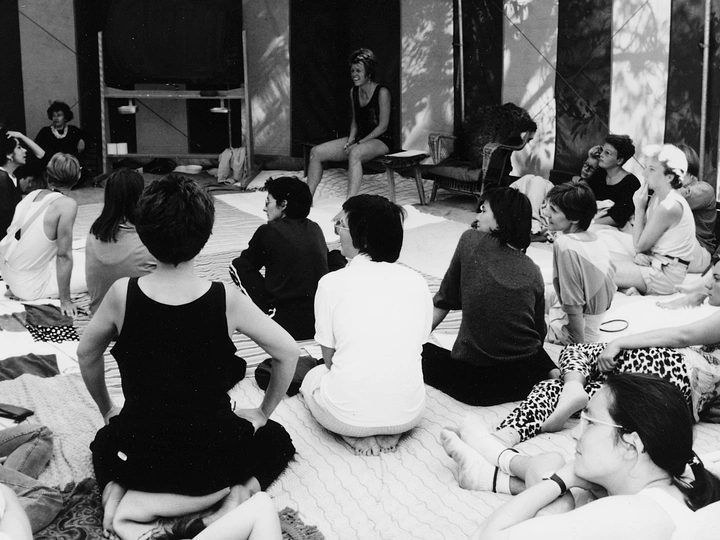Smoking in front, kissing behind the house

Laura Haensler
My name is Helena Bosch Vidal. I am a spatial designer and researcher from Barcelona, currently based in Geneva since 2017. I hold a BA in Arts and Design from Escola Massana (2016), where I specialized in Objects and Spaces, and an MA in Space and Communication from HEAD – Genève (2019). With a strong interest in combining practice and theory, my work explores how queer identities reappropriate and transform spaces and objects.
My practice spans three interconnected areas. First, as an independent researcher and designer, I develop projects that combine historical and theoretical research with spatial and object design. Grounded in queer and feminist approaches, my work addresses both contemporary issues and overlooked histories. I have participated in residencies, conferences, and exhibitions, including the Swiss Design Awards group show in Basel (2022), la Bourse de la Ville de Genève (2023), and multiple editions of Design Days. I also took part in Understand Design as both resident and exhibitor (L’Hospitalet de Llobregat, 2020), and received a research fellowship from the City of Geneva in 2024.
Second, I work as a designer and scenographer, and I co-founded Trojans Collective, an international design group based in Geneva. Since 2019, we have created spatial and graphic designs for exhibitions, fairs, fashion shows, and private events, focusing mainly on cultural and educational clients across Geneva and Lausanne.
Third, I translate my practice into teaching and lecturing. Since 2019, I have been a regular guest lecturer at HEAD – Genève, teaching scenography and temporary spaces. I have also taught seminars on design, space, and the theory and practice of pleasure at ENSCI–Les Ateliers (Paris) and ZHdK (Zurich).
This project investigates FLINTA-only educational and holiday centers in Switzerland, focusing on how space and architecture both shaped and were shaped by the communities and practices they hosted. These spaces were envisioned as utopias: intentional retreats from urban, heteronormative, and patriarchal structures.
In 1986, seven Swiss-German women purchased a house in the village of Damvant (JU), inspired by Casa Balena in Umbria and the Boldern women’s conference of 1983. They aimed to create a feminist utopia in the Swiss countryside—a site for shared living, learning, and community building. Villa Kassandra was a three-story house that hosted a group of permanent inhabitants and temporary programs like the feminist “summer universities”, with workshops on spirituality, body work, craft, theory, and political organizing.
When Villa Kassandra closed in 1993, three former participants acquired the alpine spa hotel Monte Vuala above the Walensee in eastern Switzerland. The space was reimagined as a feminist education and retreat center, offering multi-day courses on feminism, ecology, alternative medicine, re-entry training, and spirituality.
Building on this history, I propose an exhibition display centered on the spatial histories and transformations of these sites. Using archival materials and reconstructed models at various scales, the exhibition will reflect on how representations of space—models, plans, images—serve as memories of place and its social performances. They act as scenographies of past actions, revealing their own logics, rules, and layers of visibility.
Villa Kassandra and Monte Vuala form a significant, almost underexplored, chapter in Swiss feminist and spatial history. They offer unique insight into the politics of space, education, and collective life. They open up possibilities for parallel outcomes and reflections on a larger level, speculating how we would design spaces for utopian settings and their specific practices.